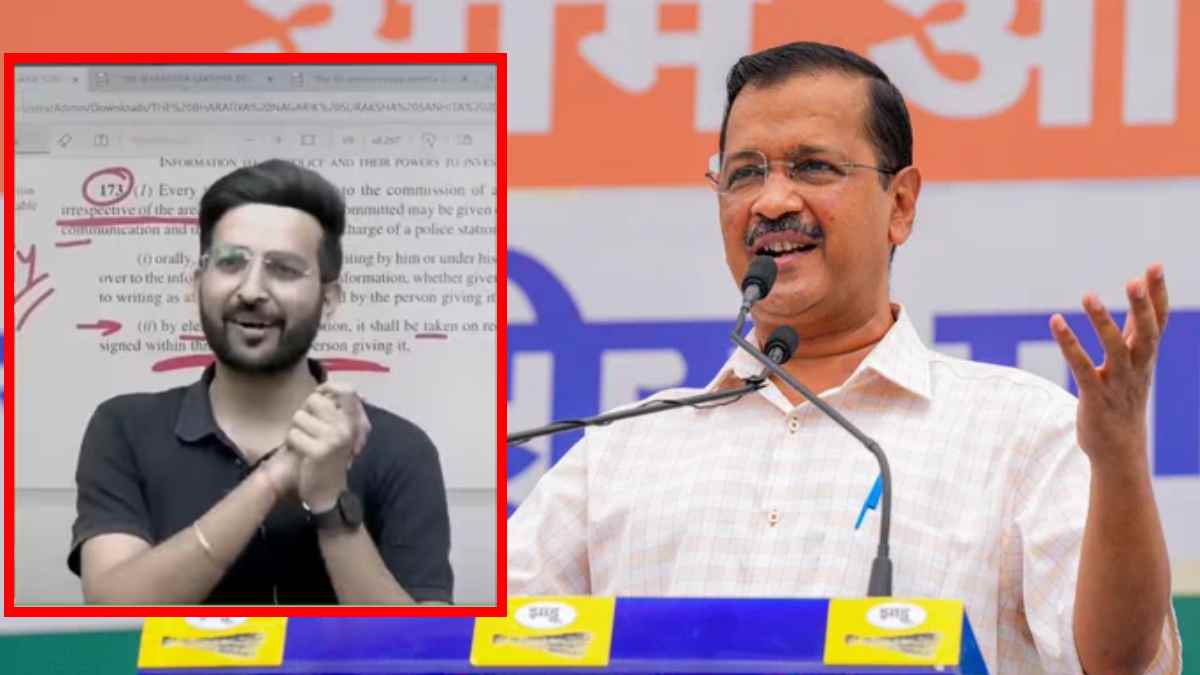Tutor Fired For Supporting Educated Politicians and Informed Voting? Unacademy Criticised By Kejriwal And Other Politicians
Arvind Kejriwal and other politicians criticised Unacademy for firing a tutor who encouraged students to vote for educated politicians and supported informed voting.

Tutor Fired For Supporting Educated Politicians and Informed Voting? Unacademy Criticised By Kejriwal And Other Politicians
Arvind Kejriwal, the chief minister of Delhi, along with other politicians and academics have slammed the ed-tech company Unacademy for firing a teacher who advocated for students to support educated candidates in elections. The action has created controversy and reignited discussions regarding whether teachers ought to influence students’ opinions on politics.
Unacademy’s Controversial Decision
Unacademy, a well-known ed-tech company recognized for providing online educational offerings, was recently condemned for dismissing tutor Karan Sangwan after he made an appeal to his students during a lecture. Sangwan advised his students, without pinpointing any politicians or parties, to vote for literate individuals in the next elections, underlining the necessity of having educated leaders in positions of power.

In response to this action, Delhi Chief Minister Arvind Kejriwal expressed his disbelief and resentment against Unacademy on the platform X, formerly known as Twitter. He questioned whether pushing for educated leaders constitutes a crime, claiming that while he respects people regardless of their literacy, public officials should ideally be well-informed in this day and age of technological advances and scientific discovery.
Is it a crime to appeal to educated people to vote? If someone is illiterate, personally I respect him. But people’s representatives cannot be illiterate. This is the era of science and technology. Illiterate public representatives can never build the modern India of the 21st century.
– Arvind Kejriwal
Critics Slam Unacademy’s Move
An outpouring of criticism from numerous sources followed the firing of Karan Sangwan. Supriya Shrinate, a spokeswoman for the Congress, attacked Unacademy’s choice by pointing to earlier tweets by the platform’s creator Gaurav Munjal that appeared to support particular political viewpoints. Shrinate criticized the platform for what she saw as a lack of spine and the capacity to resist unwarranted pressure. She shared photos of past tweets from Saini praising demonetisation as a “surgical strike on corrupt people” along with a selfie of Gaurav Munjal, founder of Unacademy, with Prime Minister Narendra Modi.
Those who cower under pressure and get bullied can never help nurture citizens who stand up against all odds to take on this world. Sad to see such spineless and weak people run an education platform.
–Supriya Shrinate
The Telangana State Renewable Energy Development Corporation’s chairman, Y Sathish Reddy, added his voice to the chorus of displeasure. He expressed his dissatisfaction with Unacademy’s actions, claiming that it was improper to suspend a teacher for simply opposing voting for candidates who lacked literacy. Priyanka Chaturvedi, an MP for the Maharashtra Shiv Sena (UBT), shared this point of view when she attacked the platform for restricting free expression and perhaps having a detrimental effect on young minds.
How does saying vote for literate politicians a biased opinion? Doesn’t that opinion positively influence young minds? Shame if merely expressing this view gets you to take someone’s job, Unacademy.
Don’t understand why everyone felt Karan Sangwan, the professor’s opinion on educated leaders was about Mr. Supreme. Repeat of Kajol level trolling, but here it cost him his job.
– Priyanka Chaturvedi
Unacademy’s Perspective
Roman Saini, a co-founder of Unacademy, justified the company’s decision by pointing to its Code of Conduct, which requires teachers to uphold objectivity in the classroom. Saini stressed the platform’s dedication to giving students balanced information and discussed how expressing personal viewpoints in the classroom could undermine this goal. He claimed that Sangwan’s violation of the Code of Conduct forced Unacademy to sever its relationship with him.
Public Outcry and Social Media Trends
An enormous public uproar followed Karan Sangwan’s dismissal, with the hashtag “#UninstallUnacademy” becoming popular on X. Academic staff, students, as well as concerned citizens all expressed their dissatisfaction with the choice made by the platform. Many voiced concern about the effects of restricting educational dialogue and questioned if supporting literate leaders could actually be seen as a prejudiced opinion.

What is the Full Controversy?
In a video that has received a lot of attention on X, Sangwan is heard highlighting the value of voting educated politicians. His attention seemed to be on the recent measures the BJP-led union government submitted in the Lok Sabha to replace the Indian Evidence Act, the Criminal Procedure Code, and the IPC, all of which date back to the British era.
“Even I don’t know whether to laugh or cry because I also have a lot of bare acts, caseloads, and notes that I had prepared,” Sangwan said in response to the rendered notes on criminal legislation. “It is hard work for everyone. You also got a job at your hand,” he remarked.
He proceeded by advising the students, “But keep in mind one thing. Next time, vote for someone who is well-educated so you don’t have to go through this (ordeal) again. Ok?” Further continuing his remarks, Sangwan added, “Elect someone who is educated, who understands things. Don’t elect someone who only knows changing names. Make your decision properly.“
Educational Motivation or Biased Suggestion?
It is a noble goal to encourage students to support informed candidates for office. After all, educated leaders are more likely to have the knowledge and abilities required to spur advancement in a world where science, technology, and well-informed decision-making are becoming more and more important.
However, Sangwan’s comments took a slightly different direction when he urged students to avoid supporting those “who only know changing names.” Moreover, the statements followed by the decision of new criminals laws seems to contextualise the opinion, which is not being highlighted. The reference here undoubtedly goes beyond a mere call for educated politicians and brushes against a specific political context.
The Responsibility of Educators and Institutions
In order to help students make well-informed decisions, educators; whether they be teachers, professors, or organizations like Unacademy, have an important role to play. Giving students the knowledge and critical thinking abilities necessary to create their own opinions and to arrive at independent decisions should be the main goal of education. It is admirable to encourage students to participate in democratic processes, but the strategy must be impartial, allowing them to consider all points of view and draw judgments according to their own parameters.
The instance of Sangwan sheds light on the risks that educators run into when they cross the boundary between political influence and motivation. Focusing on the dissemination of knowledge, encouraging critical thinking, and cultivating an atmosphere conducive to fair debate and open discussion should be the goals of educators. When educators offer one-sided opinions or biased suggestions, it hampers with the students’ capacity to think critically and make well-informed decisions.
Teachers hold the responsibility of being mentors and guides in a student’s journey of intellectual development. Their role and responsibilities extend much beyond the subject matter; they assist in shaping the character, values, as well as perspectives of their students. This is a significant responsibility that should be carried out with unhampered commitment to objectivity and impartiality.
A true educator’s goal should not be to mould students into clones of themselves or to push specific ideologies, but rather to spark curiosity, encourage inquiry, as well as equip students with the tools to analyse complex issues and then go on to make choices that align with their personal convictions and values.

Appeal for Educated Politicians
Educated politicians bring valuable insights as well as skills to the political arena, which cannot be disputed. In an era, which is filled with technological advancements, scientific progress, as well as complex global challenges, leaders with a strong educational foundation can navigate intricate policy matters efficiently.
Critical thinking, data analysis, as well as an understanding of global dynamics are crucial attributes which politicians with educational backgrounds possess, allowing them to make informed decisions for the citizens which further shape the future of a nation. Politicians with education are better able to lead with vision and competence because of their understanding of the complexity of policy, participation in evidence-based decision-making, as well as the ability to successfully communicate with a variety of stakeholders.
Therefore, the advocacy for backing educated candidates is thus more than just a personal preference; rather, it is a plea for leaders who can lead successfully in a world that is changing drastically.
The Path Forward
The dismissal of Karan Sangwan from Unacademy serves as a reminder of how crucial it is to strike a balance between encouraging civic engagement and avoiding overt bias. Providing students with opportunities to think critically, encouraging intellectual development, and laying the groundwork for democratic engagement centered around informed decision-making are the educators’ and institutions’ primary responsibilities.
The fact that a number of lawmakers supported Karan Sangwan’s assertion does not always signify bias or improper influence. Sangwan’s recommendation to support educated candidates is consistent with the general consensus that educated leaders are better able to handle the difficulties of contemporary governance. While political leaders’ support from the public may be influenced by their agreement with this point of view, it is crucial to remember that their support is a position on a larger problem rather than the outcome of personal affiliation.
The classroom, though, is a place for learning, not for propaganda. Teachers should encourage students to consider other points of view, weigh the available data, and draw their own conclusions. Only then will we be able to guarantee that the following generation of voters will actively participate in our democracy, equipped with a broad education as well as the capacity to create opinions that are wholly unique to them.
The basis for a healthy democratic discussion is laid by acknowledging the value of educated politicians in government while allowing students’ autonomy to choose their own beliefs. Teachers may empower students to have productive political discussions while also making decisions that are in line with their principles by creating an environment where communication flourishes.
Striking this balance continues to be crucial as we manage the complexity of the educational landscape as well as the requirements of modern democracy. The goal is to provide students with the information to actively participate in political processes and make decisions that will influence the future of their society, in addition to educating and inspiring them to do so.





